In reality, schools are often more than just places for learning and behavior change. If school sanitation and hygiene facilities are deficient, schools become perilous place to spread the diseases & pollute the natural environment in such a way that it causes health hazards for the community at large. Access to sanitation has been recognized by the UN as a human right, a basic service requirement to live a decent life. The combination of adequate facilities, exhaustive behavioral practices and hygiene education helps to have positive impacts on health of the pupils and the community as a whole. Consequently it is requisite to overcome the challenges and prioritizing school sanitation for safe and children friendly environment.
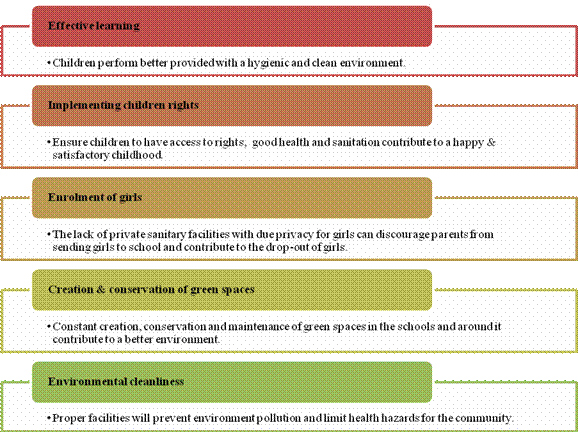
Key School Sanitation Policy Issues
SOURCE-Water, Sanitation and Hygiene Standards for Schools in Low-cost setting
Existing Policies and Schemes School Sanitation and Hygiene Education
School Sanitation and Hygiene Education is a comprehensive and effective intervention promote safe water, hygiene behavior and sanitation facilities in schools, which enable friendly environment in school. Children right to access for healthy and clean environment is promoted through this initiative. SSHE vision route towards capacity building for teachers, NGO's and agencies. It envisages forging a bridge between school children, their families and communities on water, sanitation and hygiene issues. At present it is implemented under Total Sanitation Campaign (TSC) and given special thrust by teacher-children-family-community where child considered as changing agent in communities which route to improved sanitary and healthy practices.
Also guidelines were framed to attain efficiency in service delivery, where construction of toilets depend upon the enrolment in the school.(Manual - http://www.unicef.org/publications/files/CFS_WASH_E_web.pdf). Allocation of funds for School sanitation is provided by the Central and State Government in the ratio of 70:30 under TSC, Central assistance per unit will be restricted to 70 percent which costs Rs.35,000/‐ (Rs. 38,500 in case of hilly and underdeveloped areas) per unit with effect from 1st April 2010. State/UT Governments, Parent‐Teachers Association and Panchayat can contribute beyond the approved amount.
SOURCE-School Sanitation and Hygiene Education: concept paperNSUP- STATE SANITATION STRATEGY
To improve the sanitation situation in urban areas, the Government of India announced the “National Urban Sanitation Policy” (NUSP) in October 2008. The NUSP riveted on framing the strategies to tackle the issue of city sanitation. The policy accentuated the need for generating awareness about sanitation through an inclusive approach at city level by strengthening institutional responsibilities to enhance service delivery with a special focus on the women and urban poor. All the states consent to par with the NUSP to concentrate on State Sanitation Strategies (SSS) and preparation of City Sanitation Plans (CSPs) given that the sanitation is a State subject as per the Constitutional provisions.
As a part of its support to the NSSI of MoHRD, GoI, GIZ has established a technical cell at CBSE and published a manual on school sanitation at national level, which will act as a nation-wide nodal platform for improving school sanitation and awareness rising on issues concerning sanitation and hygiene under NSUP.
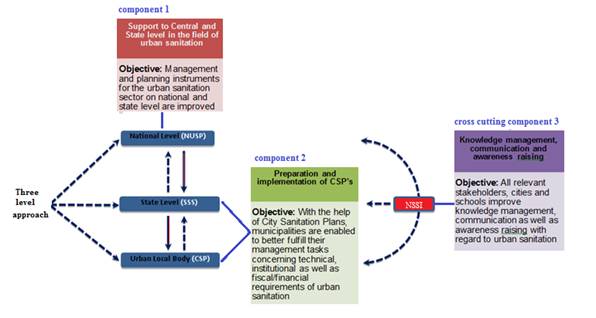
The State Sanitation Strategy will account for 30 years perspective with the guidelines laid down by the Central Public Health and Environmental Engineering Organization (CPHEEO). This perspective aimed at improvement in sanitation infrastructure through well-defined short, medium and long term strategies, this programme will establish innovative approaches and technologies through Public Private Partnerships (PPP’s) for planning and implementation.
National school sanitation initiative commenced by the Central Board of Secondary Education in collaboration with Ministry of Human Resource Development, Ministry of Urban Development and GIZ launched the National School Sanitation Initiative in 2009.The intention of NSSI is to meliorate access to school sanitation, creating responsiveness and social dialogue among teachers, students and parents which will build behavioral change to nurture hygiene and sanitation within the community thereby giving it utmost importance.
The strategy of NSSI emphasis on school sanitation through concrete improvement by providing a Stepwise Guidebook manuals (http://schoolsanitation.com/pdfdocument/1309769575PDF00000002NSSI_ManualBook.pdf), handbooks, e-learning and other materials which contribute to systematic approach in implementation. It concentrate on practical aspects of sanitation, personal hygiene , clean toilet habits , safe drinking water, separate toilets for girls, disposal of waste water, human excreta disposal, waste water recycling, waterless urinals, waste segregation and compositing, food hygiene and conservation of green spaces.This programme allocates incentives to schools to get them involved in rating themselves through the Waves of Change (WoC) Programme (http://schoolsanitation.com/pdf/woc-Stepwise.pdf). Also prioritizing emphasis on capacity building through
Sustainable Sanitation Exchange program and Certificate course on school sanitation.
This kind of dawn taken up by government would promote the child rights and contribute to awareness propagation among students, schoolteachers, staff, parents and the community.
UNICEF endorses the national and state government in intervention of models for planning and implementation of sanitation, hygiene and water supply. UNICEF’s contribution towards Childs Environment Programme in India focus on the government’s flagship programs such as Total Sanitation Campaign and the National Rural Drinking Water Programme. It engages with the Sarva Siksha Abhiyan and Integrated Child Development Services, to promote hygiene water and sanitation services in schools, Anganwadi centers, health centers by prioritizing social dialogue, participation and capacity building to attain efficiency and ensure the rights of children.UNICEF and IRC International Water and Sanitation Centre had published handbook for teachers on School Sanitation and Hygiene Education - India in 2002. This report will help teachers to teach children about sanitation and hygiene behavioral changes by Nali Kali approach & Child-to-Child approach.
links:Sarva Shiksha Abhiyan (SSA) was initiated by government of India's for achievement of Universalization of Elementary Education (UEE) as mandated by 86th amendment to the Constitution of India making free and compulsory education to the Children of 6-14 years age group as access to fundamental Right. The programme seeks to support and strengthen existing school infrastructure through provision of additional class rooms, toilets, drinking water, maintenance grant and school improvement grants.SSA has a special focus on girl's education and children to cater the special needs.
WASH in schools because every child deserves an access to rights. Factors related to water, sanitation and hygiene affect children’s right to education in many ways, for example children with poor health couldn't fulfill their education potential. UNICEF and its partners focus on improving health of school-aged children, hand-washing facilities in schools, life skills development, highlighting the need for hygiene by ensuring healthy and well-nourished to gain benefits. UNICEF water and sanitation programmes especially focus on girls by provision of water supply to homes which increases girl's free time and boosts the school enrollment.
This programme is developed and implemented by UNICEF, SLTS draws from the Total community led sanitation to create sanitation friendly and hygiene communities, initiated at the school level and extends to the welfare of community. Its approach towards the children work as a pressure group to catalyze and bridge the gaps and par with total sanitation in schools, homes and communities for building toilets and adopting good hygiene behavior, this programme base the elements from a wide range of community approaches to create a movement for communities to become open-defecation free (ODF). The school led total sanitation program accentuates the elimination of open defecation from the catchments of the schools as necessary for mending hygiene behavior and sanitation. It aims to ensure matter of dignity and rights of child by empowering the communities with improved hygiene and sanitation as self -realization.
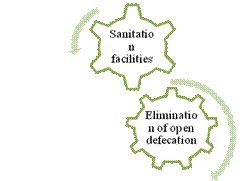
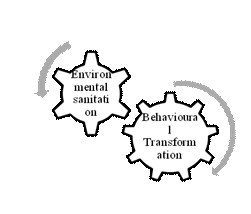
Program activities
Second Phase
Third Phase
First Phase
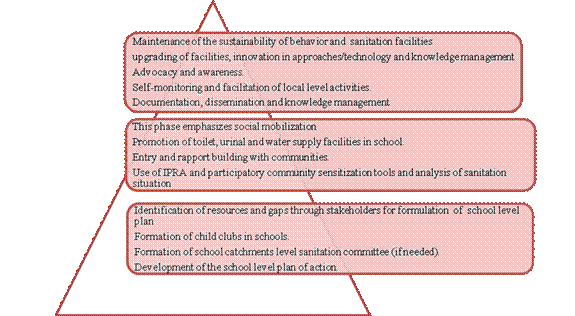
The Sulabh School Sanitation Club is a child-centred and girl-led global movement by children and young people contribute to social transformation in schools by empowering students through hygiene education. It operates in schools and communities with girls taking the lead; boys acting as strategic allies while the other community people provide the knowledge and expertise. It has established by Dr.Bindeshwar Pathak commenced reform movement which is implementing in 12 states of India.
This club has initiated to give guidance, counseling and awareness among students especially girls who need counseling about issues like menstruation. This initiative engages students both boys and girls, ranging from 10 to 16 years of age through participatory tools. They ensure access to water supply and sanitation facilities, and spreading hygiene messages among their peers. The activities are drawn to protect the rights of girls, boys and women to improved sanitation, hygiene and safe water in realization of the rights of children to learning, survival and development.
National Program Outline on Water and Clean EnvironmentThis scheme was initiated by Plan India is an Indian NGO working to improve the lives of disadvantaged children, their families and communities through children centric approach which extend to community development. To ensure the protection of self dignity, it has pioneered one of the approach i.e. Right to drinking water and clean environment (http://planindia.org/our-work/our-programme-priorities/our-programme-priorities/#6-right-to-drinking). The National Program on Drinking Water and Clean Environment concentrate on two major interventions (i) School Children-led total sanitation approach at school and in its catchment and (ii) Facilitating children and community to ensure safe drinking water.
Program ObjectivesSwasthh is one of the Central government initiative aimed at changing the culture of schooling in rural India. It aims at transformation of school environment and creating child friendly under Swasthh which includes provision of water facilities, sanitation, hygiene behavior and emphasis on cleanliness. This programme, initiated by UNICEF in collaboration with SSA in three districts of Karnataka, Gulbarga, Raichur and Tumkur, aims at universal enrolment, attendance and retention in an environment conducive to learning. Its key concern is to infuse behavioral changes among school children on better health and hygiene practices and guide teachers to sensitize and motivate them to effectively execute the sanitation practices in schools through children.
Links:Initiatives taken by Government of Andhra Pradesh
Government has formulated a handbook which is an initiatory step to contribute effectively in handling city sanitation plans across the ULBs of the state in order to achieve the objectives outlined in NUSP 2008 in holistic manner. This handbook facilitate knowledge and information about sanitation management and SWM status, legal framework, German best practices extended to initiate action plan of Andhra Pradesh for immediate implementation on Learning’s.
Link: http://www.cdma.gov.in/CDMA/Initiatives/pdfs/Hand%20book%20on%20Sanitation%20and%20SWM.pdf